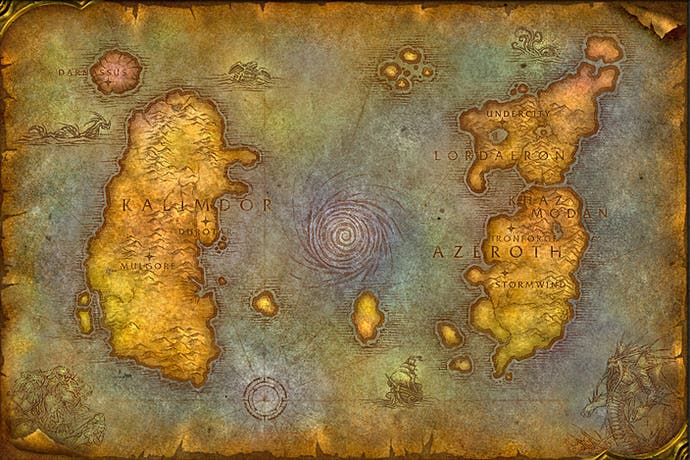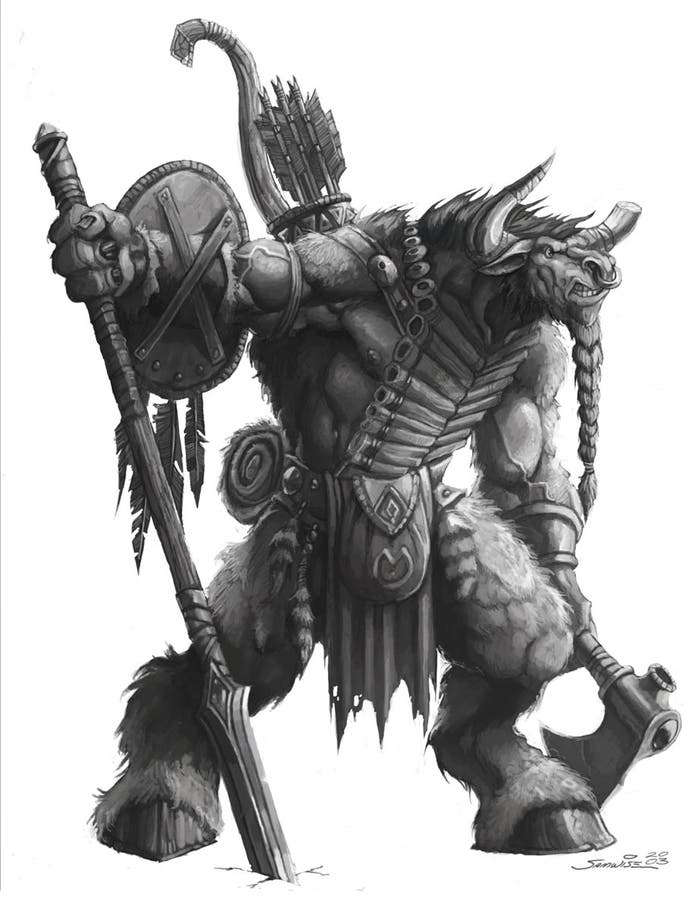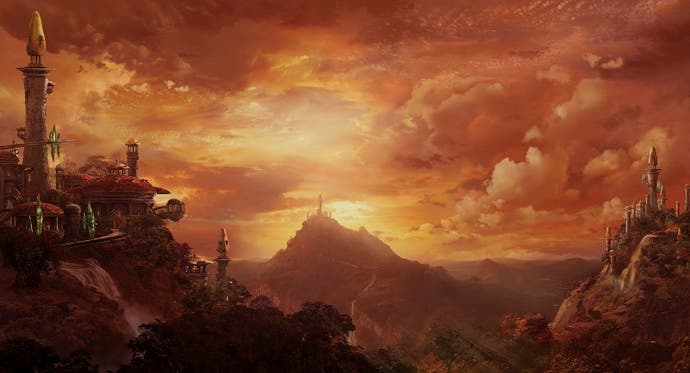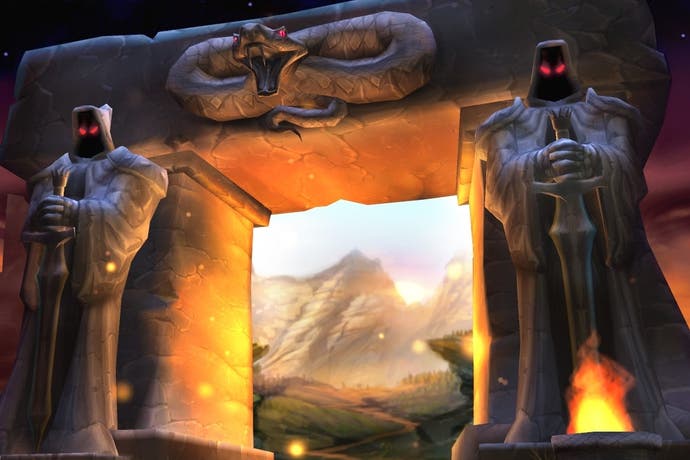World of Warcraft was a defining game of its generation
From the archive: A world apart.
Every week we bring you an article from our archive, either for you to discover for the first time or enjoy again. Today, to celebrate the 10th anniversary of World of Warcraft and to kickstart a week of celebration on the site, we bring you Oli Welsh's take on Blizzard's defining MMO, originally published as part of our series on games of the generation..
You can never go back. Or can you?
It's a defining characteristic of this generation that most of the games in our list play differently now than they did at launch. Bugs have been fixed, classes rebalanced, level caps raised, new content and modes added. The internet has even reached into solo experiences like Bethesda's RPGs and synced them with the remorseless march of time. If such a thing as final cut ever existed in video games, it's gone now. You can still experience most of the original versions if you try, but you'll have to try: wipe that install, delete that save data, unplug the router.
For World of Warcraft, though, that's all but impossible. Blizzard's mighty online world is now almost unrecognisable as the game that, just before the new consoles launched, heralded the dawn of a new age - the age, in the term coined by Valve's Gabe Newell and parroted by an army of publishing executives, of "games as a service". Not only has WOW undergone constant evolution in mechanics, design and philosophy over the last nine years, but its original content is gone. Wiped from the servers, never to return.
It was swept away by the broom of 2010's Cataclysm expansion, which exhaustively redesigned two continents' worth of dungeons and questing, in many places from scratch. This is a game that now contains nostalgic references to an earlier version of itself. Cataclysm was unpopular with WOW players - mostly for other reasons to do with its endgame - but it still might be the single most extraordinary thing I've seen a games developer do in my decade or so writing about games.
Blizzard is not an innovator. The Californian studio is a tinkerer, a genius reverse-engineer that can break down any game design and rebuild it better than it was. It's doing it now with trading card games in Hearthstone: Heroes of Warcraft, and hopes to yet again with Dota-style arenas in Blizzard All-Stars. World of Warcraft was its attempt to clean up EverQuest-style massively multiplayer online RPGs. The studio took the raw materials of these powerful, yet punishing and unfathomable experiences and sculpted them into a smooth popular entertainment on an unbelievable scale, one which offered multiple levels of depth to suit every kind of player. (If you ask Blizzard's design chief Rob Pardo what made WOW the hit it was, he'll tell you it was something as simple as how the game handled player deaths.)
Then Blizzard turned those same processes inwards and started working on its own design, stripping and rebuilding, stripping and rebuilding, pitilessly examining every decision it had previously made and reversing a great many of them. Freed from thinking in stepped sequels and funded by vast subscription revenues, Blizzard showed a remarkable level of self-criticism in an update process that began as soon as the game launched and continues to this day - but that reached its apotheosis with Cataclysm.
"If one game is responsible for making my career, it's World of Warcraft - but it came close to ruining it, too"
I admired the hell out of Cataclysm, but what I didn't admit in my review - to my great regret - is that it also made me sad.
Let me take you back to 2005. If one game is responsible for making my career, it's World of Warcraft - but it came close to ruining it, too. After a year or so writing game reviews in my spare time, I'd just started freelancing full-time when a friend and editor sent me a copy of the game, unbidden, urging me to join a group of friends online. Sceptical, I installed it, made a warrior because I was told the group needed one, and frowned my way up to level 10, finding it boring and slow. And then... It was as if I looked up from my PC and two months had passed, and I was still in my pyjamas. Needless to say, it wasn't a productive start to my writing career.

You can never go back. I can recall it like it was yesterday, though. For some reason, the Barrens zone especially sticks in my mind. Pre-Cataclysm, this derided locale was an empty expanse of arid grassland, sparsely populated with dull quests and notorious among Horde players, for whom it was an early levelling area, for nettlesome Alliance raids and a chat channel filled with sub-literate neophytes.
It was magical.
Although the graphics were quite simple even then, the atmosphere made my hair stand on end. I can vividly recall the feeling it gave me of walking across the open pampas at night. The decision to lock the game's evocative 24-hour day/night cycle to the server clock - so if you played only in the evenings, you only ever saw Azeroth at night - was a particularly brave stroke of genius that hugely enhanced my sense of immersion in the game. This was rapidly accelerating anyway, as I came to appreciate the sheer scale of the map and gawped at the spectacle of a world that was permanently populated with real people.
I play games for a few reasons, but one of the principal ones is to feel transported to another world. No game has ever evoked this feeling in me as strongly as World of Warcraft in its first months, and I suspect none ever will. The Barrens may not have been great game design, but it was an authentic place, and WOW had dozens more like it.
"We were making our own fun in a world that was still bigger than the game it contained - that was not yet dissected and delineated by optimal levelling paths and habitual, hamster-wheel efficiency"

Back then, the rest of that world was unknown to us. My guild chat was filled with excited reports of new game mechanics or adventures in new zones: the first ride on a wind rider, the first view of Thousand Needles, the end of the exhausting grind required to get enough money for a mount. There was a constant and escalating sense of discovery that lasted for months, and it felt like it would never end.
We were making our own fun, too, in a world that was still bigger than the game it contained - that was not yet dissected and delineated by optimal levelling paths and habitual, hamster-wheel efficiency. My warrior was an engineer by trade, and with my friends' help I embarked on an epic, pointless quest to build a mechanical squirrel pet for every single member of my guild. I sent the completed pets by in-game mail, in virtual wrapping paper. I had a macro set up so that I could use a single key press to spam guild chat with the lyrics to Althea & Donna's seminal reggae hit Uptown Top Ranking. I couldn't tell you why.
I started writing about the game. I became fascinated by MMOs, which were so unlike other forms of game design, and investigated others. Few games journalists had the time or inclination to explore this field in depth, so I specialised, making myself useful to editors. I interviewed the members of my guild (it was called Amazing Squad) for a magazine feature. I travelled to the US for Blizzard's extraordinary fan convention, BlizzCon, in 2007. In 2008, I joined Eurogamer as MMO editor, with the intention of building a new section of the site dedicated to this exciting sector.
There was only one problem: World of Warcraft. It was too big to fail, and too good to beat. The rest of the games industry, dollars in its eyes, tried to do to WOW what WOW had done to EverQuest, but Blizzard was always one step ahead. In 2008, with the Wrath of the Lich King expansion, the game reached its creative peak. Under the designer Jeff Kaplan, the WOW team wove flowing quest lines and challenging yet accessible multiplayer content into a coherent geography and narrative, giving it all a sweeping, elegiac tone.
It was glorious, but it left no room for other games to breathe alongside it, and the genre stifled. If WOW is one of the most influential games of its generation, its influence was not always benign, and few survived to inherit from it. (That's especially strange when you consider that, for a couple of years, every game developer you ever spoke to was playing nothing but WOW and Guitar Hero - another phenomenon in a bubble.)
Although I always enjoyed covering the game professionally, as a player I drifted in and out of it. I had a passionate second honeymoon with Wrath of the Lich King. I boggled at Cataclysm, rolled the druid I had always wanted - but as soon as my review was done, I stopped playing. The game was definitively better than it used to be, more rational, easier to enjoy; I didn't have to walk everywhere because I couldn't afford a mount, or spend hours trying to arrange a simple dungeon run. But it wasn't the same. Experience, won more easily, meant less. It wasn't the game I had fallen in love with any more.
"It's the greatest virtual world ever built: sumptuous and vast and varied and so strongly characterised that players, years lapsed, still have an indelible sense of belonging"

This is a paradox for game critics that barely existed nine years ago: a game can now change for the better in ways that leave you loving it less. And there are factors external to the game at work, too, such as the inevitable process by which a game's community will strip-mine it of all its mystery and wonder until there's nothing left but a wiki.
But do you know what? WOW is still brilliant. (It certainly was the last time I dabbled, at the launch of Mists of Pandaria, and I'm told the latest patch is a peach.) It's a simple, solid role-playing game with exquisitely designed character classes and, in the dungeons and raids, some of the best co-op content you'll find anywhere. All this is set in the greatest virtual world ever built: sumptuous and vast and varied and so strongly characterised that players, years lapsed, still have an indelible sense of belonging, of actual cultural identity. For the Horde!
If you really want to turn back the clock, there are communities out there running "classic" WOW servers that attempt to preserve the game in its original state. Good on them. They're archivists, performing the same illicit but essential function that the emulation community used to in the days before Virtual Consoles and Xbox Live Arcade remakes - preserving gaming's past for posterity. I'm sorely tempted to visit one. But my rose-tinted memories of 2005 - of my personal game of the generation - are too precious to me to risk.
You can never go back. Or can you?


